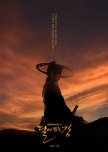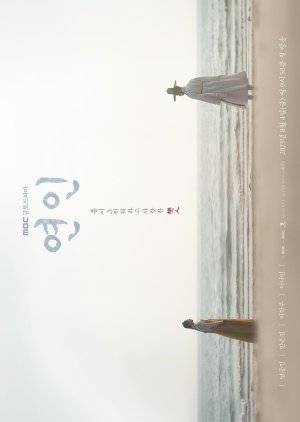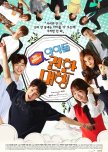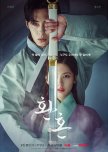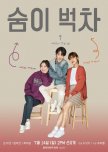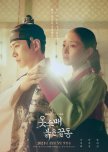
=> Both are classic melodrama romance sageuks relased within two years of each other (early 2020s).
=> Both Male leads are madly in love with the female lead, male lead is very consistent with his feelings and desire to pursue and be with female lead
=> Female lead tries her best to resist her love and feelings for the male lead
=> Male leads have male friend who is the closest we can consider for the female lead's rival of male lead's affections. Of course both male leads only have feelings for our female lead. (In Red Sleeve though, this male friend is more like just a loyal friend with no romantic feelings, but some fans do think he has sort of feelings for the male lead).
PS: For Red Sleeve fans, the show being recommended is Part 1 of My Dearest, you should check part 2 for the continuation of the story.
=> Both Male leads are madly in love with the female lead, male lead is very consistent with his feelings and desire to pursue and be with female lead
=> Female lead tries her best to resist her love and feelings for the male lead
=> Male leads have male friend who is the closest we can consider for the female lead's rival of male lead's affections. Of course both male leads only have feelings for our female lead. (In Red Sleeve though, this male friend is more like just a loyal friend with no romantic feelings, but some fans do think he has sort of feelings for the male lead).
PS: For Red Sleeve fans, the show being recommended is Part 1 of My Dearest, you should check part 2 for the continuation of the story.
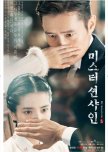
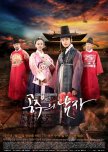
=> Both are historical Kdramas partly inspired by Western love stories. If My Dearest is partly inspired by Gone with the Wind, (as described in wikipedia), The Princess' Man is partly inspired by Romeo and Juliet.
=> Earlier episodes contain fun and lighthearted scenes before political events changed everything
=> Female lead rides a swing in both kdramas, both scenes contributed to male lead falling in love with her
=> There are scenes in both dramas of couples trying to run away.
PS: ForThe Princess's Man fans, the show being recommended is Part 1 of My Dearest, you should check part 2 for the continuation of the story.
=> Earlier episodes contain fun and lighthearted scenes before political events changed everything
=> Female lead rides a swing in both kdramas, both scenes contributed to male lead falling in love with her
=> There are scenes in both dramas of couples trying to run away.
PS: ForThe Princess's Man fans, the show being recommended is Part 1 of My Dearest, you should check part 2 for the continuation of the story.
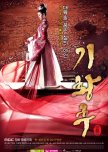
In many ways these are not that similar, but for me they both left me with a lasting impression. They are both strong historical dramas, depicting love and sorrow, hardships of war, spanning over longer periods of time.

- Both are set during the Qing invasion of Joseon
- Both have action elements and depict warfare with historical accuracy
- Both feature Joseon womenfolk having to be rescued from the "barbarians" by the men of the story
- Both have action elements and depict warfare with historical accuracy
- Both feature Joseon womenfolk having to be rescued from the "barbarians" by the men of the story
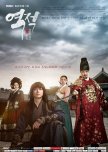
Both sageuks have really good plots with the same writer. Both male and female lead are strong characters who have to overcome a lot. Both have good OSTs, Main difference is that there is less focus on romance on Rebel Thief than My Dearest and that the main couple in Rebel Thief are friends for long before becoming a couple. Rebel Thief also has a few fantastical elements not present in My Dearest.

=> Both are set in the Qing invasion of Joseon
=> early parts of the story revolves around marriage but slowly turns to war and carnage
=> Both dramas depict how the Qing invasion really affected many people but young people who are at the stage of their lives to fall in love and get married have quite a focus.
=> There are important Qing characters.
=> Strong male and female characters (my fave actress Moon Chae Won got many awards for her depiction of the female lead in War of the Arrows => people should watch her sageuk works especially this, Princess Man, and Painter of the Wind).
PS: For War of the Arrows fans, the show being recommended is Part 1 of My Dearest, you should check part 2 for the continuation of the story.
=> early parts of the story revolves around marriage but slowly turns to war and carnage
=> Both dramas depict how the Qing invasion really affected many people but young people who are at the stage of their lives to fall in love and get married have quite a focus.
=> There are important Qing characters.
=> Strong male and female characters (my fave actress Moon Chae Won got many awards for her depiction of the female lead in War of the Arrows => people should watch her sageuk works especially this, Princess Man, and Painter of the Wind).
PS: For War of the Arrows fans, the show being recommended is Part 1 of My Dearest, you should check part 2 for the continuation of the story.

Both depict the same historical event — the Qing invasion of Joseon in 1636 and the court besieged at Namhansanseong. The Fortress is entirely devoted to portraying the siege, while My Dearest is larger in scope, thus these events are only one element of the story. Certain scenes in My Dearest were extremely reminiscent of the The Fortress, not only in content but also in how they were shot. I do think the depiction of the siege and debates between the king and ministers is more effective in The Fortress (and one would hope so, as that is the entire focus of the movie), but My Dearest offers a broader perspective on the war that goes beyond the fortress walls. Both touch on themes such as the hardships of war, the relationship between leaders and their people, the confrontation of honor and ideals with a harsh reality. The Fortress is a slow-paced, dialogue-heavy historical war movie that is entirely somber in tone. My Dearest balances moments of levity with the darker aspects and integrates war with romance; its pacing is far less glacial.
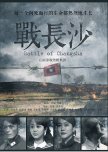
The same dynamic between the female and male lead, it also happens in the middle of a war with all of its implications.

It is believed that when a person dies, their soul spends 49 days in Jungcheon, or Purgatory before their eternal fate is decided - heaven, hell or rebirth. That's where accomplished demon hunter Yi Kwak finds himself as he lies on the edge of death in our world. Blessed with astounding swordsmanship and the uncanny ability to see the evil spirits invisible to most, Yi enlisted with the royal squad of elite demon exterminators, the Chuhyongdae, following his fiancee's tragic death. In Jungcheon, he finds Yon Hwa again, but she does not recognize him - she is a spirit of the afterlife now, severed from earthly memories. Moreover, she is deeply entangled in a great war between the white-clad warriors of reincarnation and a swarm of dark spirits determined to forever shatter the cycle of life and death. The battle is desperately close to a terrifying conclusion, so Yi must draw his sword to defend the woman he loves and all they hold dear - and confront the same soul that was once like a father to him.


Both are historical romantic dramas:
- both feature a more rebel hardworn character and a more spoiled noble character
- both feature a war between two fronts one more 'barbarian' and one overly spoiled, and indulgent
- both have an epic sweep to them with events occurring many miles apart over a long period of time
- both have a tragic undercurrent/fate separating aspect to them
- both have some thrilling action scenes
The Long Ballad does not have the same sophistication in themes and execution as My Dearest, it's much more action and cliffhanger centric.
- both feature a more rebel hardworn character and a more spoiled noble character
- both feature a war between two fronts one more 'barbarian' and one overly spoiled, and indulgent
- both have an epic sweep to them with events occurring many miles apart over a long period of time
- both have a tragic undercurrent/fate separating aspect to them
- both have some thrilling action scenes
The Long Ballad does not have the same sophistication in themes and execution as My Dearest, it's much more action and cliffhanger centric.

Both are historical romance dramas,
- Both have a tragic undercurrent to them
- Both feature a romance between an older, cynical character and a younger more optimistic one
- Both cover many miles, and many years as the characters try to be together
- Both have high production values and epic battles
The Rise of the Phoenixes is more political drama first, romance second than My Dearest
- Both have a tragic undercurrent to them
- Both feature a romance between an older, cynical character and a younger more optimistic one
- Both cover many miles, and many years as the characters try to be together
- Both have high production values and epic battles
The Rise of the Phoenixes is more political drama first, romance second than My Dearest

